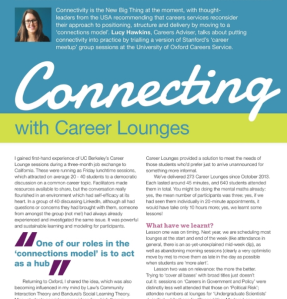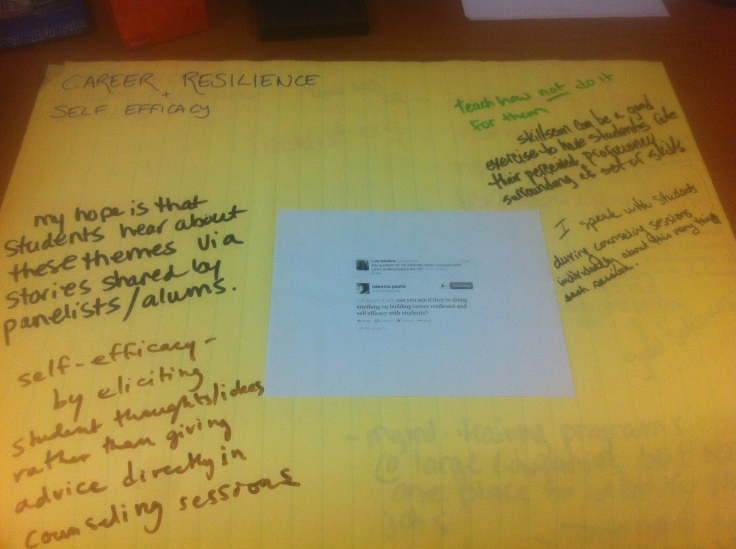I’ve been thinking about the role of careers in the wellbeing agenda and have found this a really helpful, thought-provoking talk. Thank you Glen!
Thanks to everyone at AGCAS who helped wrangle my 5,000 word assignment on this topic into a 1,000 word article for this month’s Phoenix magazine. The gist of it is that academic literature make a pretty strong case for the fields being interlinked (personal and career concerns being often intertwined) but that our services are largely still quite separate.
In chatting about this with colleagues, the point that a third of careers professionals had undertaken counselling training still really stands out for me. In our roles there’s such a breadth of skills represented, that to often it’s easy to overlook the expertise that’s within our own departments.
There’s been many occasions where I’ve felt that a client needed both services, but (as many respondents to the survey I ran mentioned) was very aware of the boundaries of my own expertise. One client in particular asked for a recommendation of a ‘true career counsellor’ who could do both, recognising that much of what was frustrating her in her career management was the same as what frustrated her in other aspects of life. There’s lots more that, having recounted what’s going on in their life at length to me, express frustration at having to go through it all again with someone new in a different service.
However, the fact that careers is quite separate can often be a good thing: respondents talked about clients in careers who ‘wouldn’t be seen dead’ in counselling, although some of the issues were quite similar. Worries about making careers ‘about problems’ or ‘medicalising’ issues surfaced too.
None the less, it’s one I’m keen to read more on – I look forward to Siobhan Neary and Tristram Hunt’s new article on the topic due soon.
 At Oxford we’ve been using ‘Career Lounges’ for a year now. These are informal democratic group discussions on career themes that aim to give access to ‘communities of interest’, role-models and promote self-efficacy. We were inspired by their use at UC Berkeley and Stanford (where they’re called ‘career meetups‘).
At Oxford we’ve been using ‘Career Lounges’ for a year now. These are informal democratic group discussions on career themes that aim to give access to ‘communities of interest’, role-models and promote self-efficacy. We were inspired by their use at UC Berkeley and Stanford (where they’re called ‘career meetups‘).
There’s an article from me about them this week in AGCAS Phoenix magazine.
For more information, my contribution on the same topic to our recent AGCAS conference is also available online. You can download the PowerPoint I gave about them. As this was a workshop session, I might advise against sitting through the whole podcast: as we worked in pairs and small groups and tried out a career lounge in the room, there was much discussion that the mic didn’t manage to pick up. I also forgot the mic was at the lectern, and merrily wandered in and out of pickup range.
We’re recording a career lounge or two here at Oxford for our website, and I’ll make sure to circulate that when it’s up online. I’ve had a fair few conversations with colleagues around the UK who are considering trying these out, so do share any comment/question/findings below – it’d be great to have an informal democratic group discussion. (See what I did there?)
October brings new tools for LinkedIn, some of them summarised in this blog post from the company. I’ve been exploring them, and find the decision board tool particularly useful for students who are comparing different courses. I particularly like the ‘conversation’ feature which allows users to post their thoughts/questions and then share the board with people they’d like to be ‘advisers’ – parents, teachers, peers, actual advisers – for feedback and contribution. A nice nod to how people actually make decisions there, and the role of feedback and support (Bill Law would be proud!) Just as a complete recap, the new tools include university outcome rankings (LinkedIn’s answer to the Times university rankings), ‘University Finder’ (searching for institutions based on a career goal) and ‘Field of Study tool’ where students who have a preferred subject can see career outcomes from that academic discipline. There’s also been a few tweaks to other areas, such as personalised invitations to connect from mobile platforms (at last!)
This raft of updates is great, but has got me thinking about the next tools/features I might like to see from a LinkedIn which is increasingly student-focused… Continue reading “New LinkedIn tools: and what I think would be really useful next”
I’ve been researching what Stanford calls the ‘Connections Model’ of career services, for an upcoming article in AGCAS Phoenix magazine and a talk at the next AGCAS Annual Conference. I wanted to share the main influences here, and my interpretation of the connection model, and how it fits in with the evolution of career services in UK higher education.
A quick summary of Stanford’s new model is here; ‘Vision 2020’ (punny!) is all about creating career communities, and I really like this how this integrating theoretical standpoints (role modelling, community interaction theory, social learning theory, self-efficacy outcomes) and strategic opportunities (internal and external engagement through increased partnership working). While we’re doing ‘background reading’, if you haven’t seen it yet, and you’re in the mood for big thinking, check out Wake Forest’s Andy Chan talking about why ‘Career Services Must Die’ for a similar, but slightly different argument on moving away from a ‘dispensary’ service.
Farouk Dey from Stanford University used the idea of a connections model as the basis for an article posted on LinkedIn recently, theorising ‘Future Trends in [University] Career Services’, which incorporated a diagram which caught my eye:
On top of my scepticism that pretty much everything career services appears to happen in neat 20 year cycles, I think there’s another reason that this doesn’t feel right to me. It’s those end dates. Continue reading “The Connections Model and Evolution of HE Career Services in the UK”
I’ve been researching lots of arts-related stuff at the moment, and bookmarking them on my Diigo. If any of the tags appeal to you in particular, feel free to click them to find my list of other relevant content for that tag. On Diigo you can also see the date that I tagged each of these (some are older than others).
I’ve only been social bookmarking for a year or so, and am always really grateful to learn more from others. Share more weblinks with me by commenting here, on Twitter or on Diigo itself if you’re a user too.
In the meantime: a linkroll for all things writing related…
The summer! For me, this is the season of re-writing resources and manically researching tips, tools and speakers for the next academic year.
And last year, full of intentions to whip the blog back into shape, I recorded a little video on how I use Diigo and other web search tips. Here it is:
I’ve also been exploring If This Then That, or IFTTT. I pronounce that ‘ifft’, by the way, which makes my other half hand me an inhaler.
Now, whenever I bookmark something, a little tweet goes out with the description and link. I use this recipe:
 https://ifttt.com/view_embed_recipe/193894-diigo-to-twitter-with-just-description-and-link
https://ifttt.com/view_embed_recipe/193894-diigo-to-twitter-with-just-description-and-link
If you’ve never used IFTTT then I can’t recommend it highly enough. It’s so easy, intuitive and just works (although the working updates every 15 minutes, so there’s sometimes a little Twitter glut. And it works for everything, so if suddenly I issue an urgent tweet about a dessert recipe, now you know why. I mean, a real recipe this time 🙂
 My LinkedIn policy has changed as I’ve evolved as a guidance professional. Having worked frequently with school settings before becoming a careers adviser, my initial reaction was to apply the rules taught to teachers. If a student wants to connect on social media don’t do it! Having been thus schooled, my old policy was to politely refuse when a student asked to connect with me on LinkedIn. I knew other careers professionals who had the same policy. This was my ‘advice for contacting’ message on LinkedIn:
My LinkedIn policy has changed as I’ve evolved as a guidance professional. Having worked frequently with school settings before becoming a careers adviser, my initial reaction was to apply the rules taught to teachers. If a student wants to connect on social media don’t do it! Having been thus schooled, my old policy was to politely refuse when a student asked to connect with me on LinkedIn. I knew other careers professionals who had the same policy. This was my ‘advice for contacting’ message on LinkedIn:
It wasn’t until a year ago that I started questioning this. Without a child protection argument to apply, why was I so careful not to connect with clients, and how was it affecting my work with them?
Here’s how I moved from ‘cautious avoidance’ to ‘genuine connection’.
Continue reading “My LinkedIn connections policy”
Taking ‘post-it’ as an imperative, here’s the fifth in the series of transatlantic discussions generated with the help of UC Berkeley’s excellent Career Counseling team. Giant post-it #4 briefly touched on the theme of self efficacy, but here it is examined in more detail… Continue reading “US/UK: Career Resilience and Self Efficacy”


